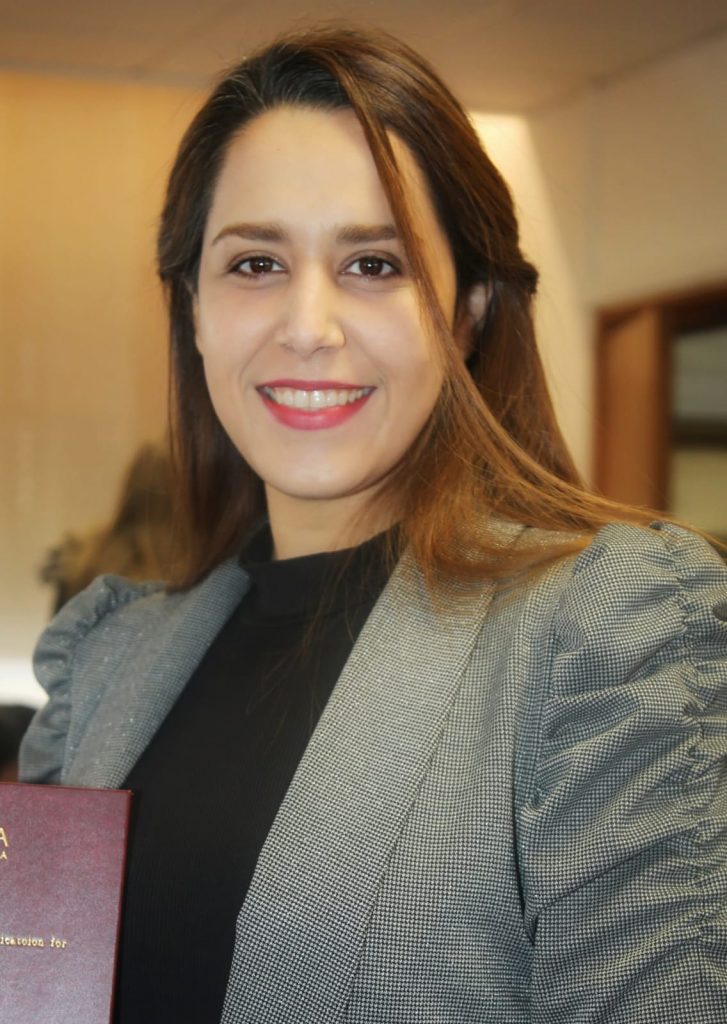25.11.2022: Melika Azim Zadegan: Don’t give up!
Melika Azim Zadegan: Don’t give up!
Words can be life-changers, in various forms, in various places. “Playing a wrong note in a piece is insignificant; playing without passion is inexcusable, (Beethoven)”, a picture hanging on the wall in my Piano class that shaped my world today. I gained lifetime lessons through Piano learning. I learned to move towards my goals passionately. I learned never to give up if I made a mistake.
I am Melika Azim Zadegan, an Iranian doctoral researcher in the Neuro-Innovation Ph.D. Programme.

After graduating in Industrial Engineering (BSc, Sadjad University, Iran) and getting a master’s degree in business administration (Azad University, Iran), I started my career path by working as an industrial engineer and marketing manager in my home country. But I had never found myself satisfied enough by working outside of academia. I like to be a researcher. It could feed my soul more than anything. I like to see the world through different lenses and cultures. “When there is a will, there is a way”; I had to get out of my comfort zone and follow my heart’s desires.
Management and organizational studies have always fascinated me! But combining the two with “Innovation” and “Digitalization” intrigued me even more! My first life-changing academic immigration started in 2019. “Economics and Communication for Management and Innovation” is the title of my second master’s degree, which I got from Sapienza University of Rome, Italy. It was a multidisciplinary master’s programme consistent with innovation management, communication, digital networks, and computer science. It was complemented by spending a semester as an Erasmus exchange student at the University of Southampton, England. I felt myself a step closer to being a researcher in a multidisciplinary area.
Even before graduation, I started searching for Ph.D. positions focusing on my research interest (Innovation Management, Digitalization), especially in the healthcare context. Moreover, getting a Marie Skłodowska-Curie fellowship, a prestigious and comprehensive Ph.D. fellowship programme that allows you to gain invaluable experiences through cross-border knowledge exchange and inter-sector mobility, is like a wish for those interested in studying multidisciplinary research areas. Long story short, I applied for the advertised Neuro-Innovation Ph.D. position, and my wish came true!
This is how I did my second academic immigration and landed in Finland. I am now officially a Ph.D. student of Innovation Management at UEF Business School and a doctoral Researcher in the Neuro-Innovation Ph.D. Programme.
My Ph.D. Project
My Ph.D. project is part of a broader ongoing study on “Remote monitoring of idiopathic Normal Pressure Hydrocephalus (iNPH) patients” led by Doctor Ville Leinonen and his team at the Kuopio University Hospital Neurosurgery unit. iNPH is a neurodegenerative disease where cerebrospinal fluid (CSF) fails to clear from the central nervous system, leading to motor and cognitive problems for the patient.
Organizing Remote Monitoring of iNPH Patients (A Multistakeholder Perspective)
It is the full title of my Ph.D. project that I am working on it under the supervision of Professor Päivi Eriksson (my main PI), Professor Simcha Jong (my second supervisor), and Doctor Ville Leinonen.
The movement toward digitalization and health technology adoption for monitoring patients remotely will impact various levels and actors. In my project, we want to approach it from innovation, management, and organizational perspectives to see the benefits and challenges of this Remote Patient Monitoring (RPM) on the patient’s and their caregiver’s life, on everyday work practices of healthcare professionals before/after RPM, technology suppliers’ view on it, and more importantly, how the collaboration between the mentioned stakeholders can be organized and optimized as RPM is planned and implemented in the hospital setting.
The brain healthcare transformation through technology-assisted health services
Remote Monitoring of iNPH patients is the next transition in improving brain healthcare services! The benefits of RPM are broad! From the patient perspective, reducing the time, cost, and hardship of traveling for those living in rural areas are considered as essential factors for utilizing RPM and shifting care from hospitals to home or digital technologies-based care!
With this background in mind, in the case of iNPH patients, regular RPM as a digital online follow-up can help detect and promptly treat shunt malfunctions. The patient’s gate speed needs to be collected via specifically equipped standard smartphones that work together with an accelerometer/gyroscope. It plays as an indicator of their health condition. In case of an unexpected decrease in activity measured by the smartphone application, the patient will receive a phone call and, if needed, ask for an additional clinical evaluation and CSF testing.
Additionally, “Time” is tied to the health condition of these patients! The current type of patient follow-up visits (usually once or twice a year) in the hospital can’t fully meet their needs, and their health condition may worsen between every two visits! Thus, integrating traditional clinical care with RPM is one possible solution for reducing the “time interval” between every two appointments and increasing the frequency of interactions between patients and health providers, which benefits both Parties (Patient and Healthcare Professionals)!
Innovation is achieved by looking outside the box
To me, “Research” is identifying an issue, zooming in to gain a more precise image, and then developing an innovative solution! “Innovation” is achieved by looking outside the box. In my research, for instance, interviews with patients and their caregivers and discovering their needs will give valuable information and a clue before designing and providing them with an effective patient-centric health service. Also, hearing the views of clinicians in the neurology department and the experiences of those who already benefited from RPM in different departments of hospitals and talking with technology providers on the potentialities of RPM can push us forward in achieving our research goals.
What Next?
All given was just an overview of what I want to work on during my Ph.D. The lovely guidance of all my supervisors in each phase of the project, alongside my “Patience,” “Perseverance,” and “Consistency,” will help to go through this journey and make all these happen!